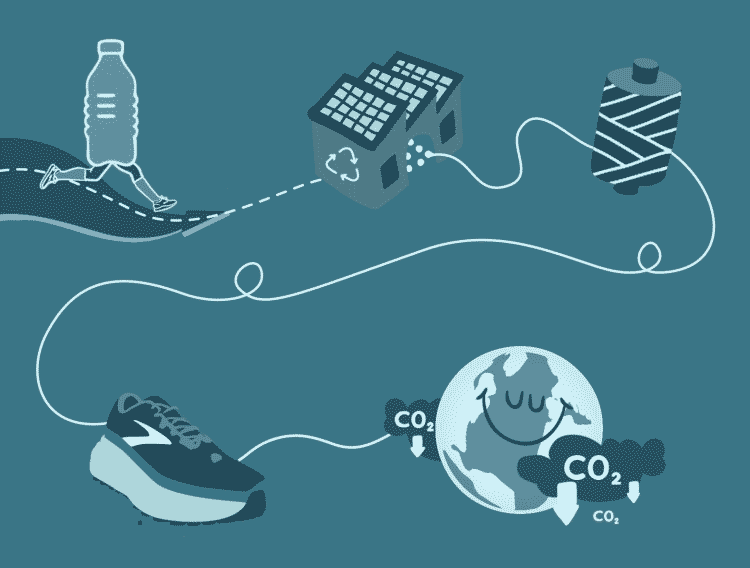Brooks laces up for a net-zero carbon emissions future

How we use plastic water bottles?
Some recycled plastics that already exist can be re-used for materials in the uppers of footwear, instead of creating new plastics.
These are commonly called recycled PETs (polyethylene terephthalate, the chemical name for plastic). PETs are clear, strong, and lightweight plastics that are widely used for packaging foods and beverages, especially convenience-sized soft drinks, juices, and water.
Recycled PETs can be source materials for recycled polyester yarn. Not all recycled plastics make polyester yarn, only PET (#1) plastics (most commonly found in plastic bottles) make polyester yarn.
More sustainable running shoes? We make those, and that’s just one of the steps we’re taking to protect the planet we run on.
At Brooks, we are committed to a long-term, science-based approach to sustainability.
As we create new gear and run our global business, we also want to minimize our impact on the planet — so we are limiting our reliance on non-renewable resources through more sustainable materialization and reduced waste.
One of our actions is to replace 100% of traditional polyester and nylon yarns with recycled polyester yarn and recycled nylon yarn in our footwear. As of 2022, 67% of Brooks’ total polyester volume comes from recycled polyester yarns, so we are more than halfway to that goal. By switching from conventional polyester to recycled materials, we reduce plastic water bottles in landfills and lower the carbon footprint of our products.
In addition, new TrailTack Green Rubber in some of our outsoles gives a second life to surplus silica material while offering runners the traction they need to explore any terrain.
Plus, for the first time ever, the midsole features 10% recycled material. But we don’t stop at recycled material. The Green Silence Ghost 15’s main upper textiles (the vamp and tongue) are the most dope dyed textiles by weight out of any shoe in our footwear line. The dope dyeing process reduces water waste by 94% and cuts greenhouse gas emissions (GHG) by 92%.
The Green Silence Ghost 15 will reduce our carbon footprint as we strive toward our goal of net-zero GHG emissions by 2040.
Read more in our 2022 Corporate Responsibility Report.
Putting the pieces together
Protecting the planet we run on is a marathon, not a sprint. Below are some steps we are taking to achieve net-zero GHG emissions by 2040.

Some recycled plastics that already exist can be re-used for materials in the uppers of footwear, instead of creating new plastics.
These are commonly called recycled PETs (polyethylene terephthalate, the chemical name for plastic). PETs are clear, strong, and lightweight plastics that are widely used for packaging foods and beverages, especially convenience-sized soft drinks, juices, and water.
Recycled PETs can be source materials for recycled polyester yarn. Not all recycled plastics make polyester yarn, only #1 plastics (most commonly found in plastic bottles) make polyester yarn.
Sourcing recycled materials
One of the ways we reduce our company’s carbon footprint is by sourcing recycled materials made from post-consumer waste products. For example, we use plastic water bottles as source material for polyester yarn that can be found in materials of some of the uppers in our footwear. Our goal is for all materials used in Brooks products to be made of a minimum of 50% recycled or bio-based content by 2030.
Run responsibly
According to the Center for Sustainable Manufacturing and Recycling Technologies, 1,2 million tons of used shoes are thrown away in the EU every year. Poorly made shoes contribute to a fast-fashion lifecycle. Brooks focuses on making well-made shoes runners can stick with for the long run. By focusing on how recycled polyester and recycled nylon yarns can be woven into a shoe, we work to lower GHG emissions before a shoe goes for its first run.
Finally, Brooks makes each shoe to last, so you only need to replace your running shoes once or twice a year.
Tip: Want to learn when to replace your Brooks running shoes? Read this article to find out how often you need new kicks.
Next steps
Did you know that traveling a mile takes the average person 2,000 steps? It’s true, and Brooks is designing and building shoes to last one million steps. We are working to protect the planet we run on by using more recycled post-consumer waste plastics in our products.

The new Green Silence Ghost 15
The Green Silence Ghost 15’s carbon footprint is 9.03kg CO2eq per pair. By comparison, the carbon emissions of the Ghost 15 are 9.51 kg CO2e equivalent per pair.
Run Happy, run more sustainably
On average, 67% of our current footwear uppers are made from recycled materials.
The Caldera 6 contains the highest uptake among our current offerings, with 80% of the footwear upper made from recycled materials.
Learn more about our trail shoes and explore our efforts to Run Responsibly.
Do your part
Here are ways that you can help make the run more sustainable.
- Hydrate with re-usable water bottles instead of single-use plastic bottles. For those that prefer flavor or nutrient add-ins, companies like Nuun make recyclable packs of ten dissolvable tabs to enhance your hydration.
- Don’t want to lug around a bulky water bottle? Carry a reusable cup you can tuck in your pocket or bag for easy fill-ups on the go.
- Make your own run snacks. When you buy nuts, seeds, and candies in bulk, you reduce the need for single-use plastic packets.
- Looking for more sustainable running clothes? We've got everything from eco-friendly running gear and vegan running shoes to ethical running clothes. Discover more sustainable running clothes and shoes!
This is a carousel. Use next and Previous buttons to navigate.
